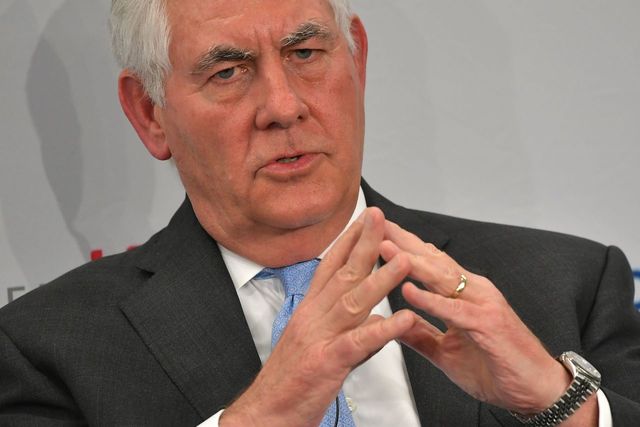 |
|
US Secretary of State Rex Tillerson speaks at a forum sponsored by the Korea Foundation and the Atlantic Council called, “Reimagining the US-Republic of Korea Partnership in the Trans-Pacific Century,” in Washington, D.C. on Dec. 12. (AFP/Yonhap News)
|
The US and China have discussed the issue in various official forums
US Secretary of State Rex Tillerson made relatively positive dialogue overtures to Pyongyang – but also overt reference to the possibility of a sudden upheaval in North Korea, a particularly sensitive subject for Pyongyang and Beijing. The remarks came while Tillerson was delivering a keynote address at a forum on “Reimagining the U.S.-Republic of Korea Partnership in the Trans-Pacific Century,” co-organized by the Korea Foundation and the US think tank Atlantic Council in Washington, DC, on Dec. 12. During his address, Tillerson said the US had “had conversations” with China about what could be done “in the event that something happened . . . internal to North Korea.” While reaffirming the US position that it does not seek regime change or collapse, Tillerson also suggested Washington was not ruling out the possibility of the Pyongyang regime collapsing due to an upheaval or internal instability. He also said the issue had been discussed in the US-China Diplomatic and Security Dialogue in June 2016 and in other senior-level dialogue. “If [some event] unleashed some kind of instability, the most important thing to us would be securing those nuclear weapons [North Korea has] already developed and ensuring that . . . nothing falls into the hands of people we would not want to have it,” Tillerson said. “We’ve had conversations with the Chinese about how might that be done,” he added. “We have had conversations that if something happened and we had to go across a line, we have given the Chinese assurances we would go back and retreat back to the south of the 38th parallel,” he continued, adding, “That is our commitment we made to them.” His message was read as a reassurance to Beijing, which sees North Korea as a strategic buffer zone and regards the stationing of US troops there a major security threat. Tillerson also commented on the possibility of large numbers of refugees crossing the Chinese border in the case of a North Korean collapse. “China is taking steps to prepare for such an eventuality,” he said, adding that the threat of a mass influx of refugees was “something that [China] can manage.” The possibility of an upheaval in North Korea is something US and Chinese experts have discussed regularly since the late 2000s. But despite Washington’s persistent demands, no headway has been made in intergovernmental discussions due to objections from Beijing. It is unclear whether Tillerson was referring to the US unilaterally relaying its position to China or holding practical discussions with it. The remarks also suggested an attempt to apply pressure on Pyongyang and Beijing. With the ball falling in North Korea’s court, its response is predicted to be key in whether dialogue takes place in the future. In past Track 1.5 dialogues, Pyongyang has consistently maintained that it is unwilling to put the denuclearization issue on the table for negotiation. By Yi Yong-in, Washington correspondent Please direct questions or comments to [english@hani.co.kr]






